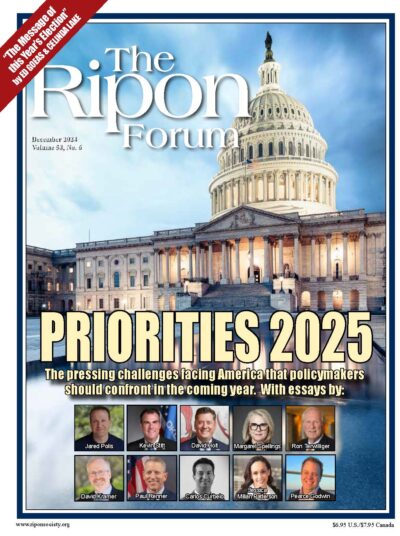
What role the United States will play on the world stage is one of the biggest questions surrounding President Trump as he returns to the White House in January.
As the greatest country in the world, with the most powerful military and strongest economy, the United States has global responsibilities. It’s important that we support fellow democracies and people striving to live in freedom. It also serves our national security and economic interests to encourage prosperity elsewhere, developing trade partners and allies to whom we can turn for help in defeating terrorism and confronting authoritarian challenges in places like Moscow, Beijing, Pyongyang, and Tehran.
A more democratic and prosperous world has and will continue to redound to America’s benefit. There is no pause button for us to press to stop global challenges while we get our own house in order. U.S. leadership requires vigilance and constant commitment. Otherwise, we risk ceding the global field to Russian and Chinese leadership – and that would be a world deeply contrary to our interests.
There is no pause button for us to press to stop global challenges while we get our own house in order. U.S. leadership requires vigilance and constant commitment.
This is especially important right now because the new administration and new Congress face a world in turmoil, from Europe to the Middle East, from the Far East to Latin America. It’s no time to yield to calls to turn our backs on the world and only focus on problems at home, even though we do have many domestic challenges, including immigration, inflation, crime, and coarsening discourse.
“Since World War II, America has encouraged and benefited from the global advance of free markets, from the strength of democratic alliances, and from the advance of free societies,” President George W. Bush said in 2017. “The 20th century featured some of the worst horrors of history because dictators committed them. Free nations are less likely to threaten and fight each other.”
We must not surrender to isolationist tendencies. We and the world paid a dear price for doing so back in the 1930s, and we must not repeat that mistake.
The new Senate Republican majority has a “responsibility to secure the future of U.S. leadership and primacy,” U.S. Senator Mitch McConnell (R-KY), who will be stepping down as Republican Leader in the new Congress, recently argued. American leadership since the end of World War II has made the world safer and richer.
But nonstate actors, together with authoritarian leaders, still wish to do us harm.
The end of the Cold War, a celebrated moment that saw the liberation of numerous countries from Soviet control, didn’t end the challenges we face.
The Russian, Chinese, North Korean, and Iranian regimes are working together, coming to each other’s aid, and trying to undermine the very idea of democracy and U.S. reliability and leadership. They seek to weaken our economic primacy. They want to see our internal divisions spill over into chaos and bloodshed.
We must not let this happen.
The Russian, Chinese, North Korean, and Iranian regimes seek to weaken our economic primacy. They want to see our internal divisions spill over into chaos and bloodshed. We must not let this happen.
“Division among free nations is a primary goal of freedom’s enemies,” President Bush said in his second inaugural address. Similarly, division within our own society advances our enemies’ goals.
It’s vital for Americans to respect our institutions, our elections, our media, and our political opponents so that we remain that shining city on a hill. We must avoid inadvertently assisting the authoritarian regimes by letting our internal divisions and polarization distract us from our global leadership role.
This is not to say that we should be the world’s policeman, nor should we assume the burden alone. Our allies need to step up and do their fair share, and the countries we help need to take on their own responsibility as well.
Just as Pearl Harbor brought a battle to our shores and instantly silenced any isolationist voices around World War II, our adversaries are nearing our vital interests today, either physically or digitally. The next administration will not have the luxury of withdrawing from the world stage. Whether we want it or not, the global stage will come to us.
U.S. leadership in the world requires resources to provide for peace through strength. It entails political commitment from Congress and the executive branch. It involves buy-in from the American people, whose sacrifice and generosity over the years have made us the envy of the world.
There is no guarantee we will remain at the top unless we work hard at staying there. But the alternative to U.S. leadership is worse than anything we can imagine, and is something we must avoid at all costs.
David J. Kramer is Executive Director of the George W. Bush Institute and a former U.S. Assistant Secretary of State for Democracy, Human Rights & Labor.




